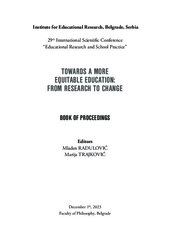Prikaz osnovnih podataka o dokumentu
The application of sociometric techniques in research on peer relations in inclusive education
| dc.contributor | Radulović, Mladen | |
| dc.contributor | Trajković, Marija | |
| dc.creator | Ratković, Marija | |
| dc.creator | Medar Zlatković, Jelena | |
| dc.creator | Stanišić, Jelena | |
| dc.date.accessioned | 2023-11-28T23:02:35Z | |
| dc.date.available | 2023-11-28T23:02:35Z | |
| dc.date.issued | 2023 | |
| dc.identifier.isbn | 978-86-7447-165-4 | |
| dc.identifier.uri | http://ipir.ipisr.org.rs/handle/123456789/1011 | |
| dc.description.abstract | The application of sociometric techniques is commonplace in research on social relations between students included in a model of inclusive education and their peers. Since the acceptance of children with developmental disabilities is a crucial prerequisite to a more equitable education, this paper aims to explore the advantages and shortcomings of the application of sociometric techniques, which are most commonly associated with the positivist paradigm in the study of contemporary pedagogical concepts such as inclusion. | sr |
| dc.language.iso | en | sr |
| dc.publisher | Belgrade : Institute for Educational Research | sr |
| dc.relation | info:eu-repo/grantAgreement/MESTD/inst-2020/200018/RS// | sr |
| dc.rights | openAccess | sr |
| dc.rights.uri | https://creativecommons.org/licenses/by-nc-nd/4.0/ | |
| dc.source | Towards a More Equitable Education: From Research to Change | sr |
| dc.title | The application of sociometric techniques in research on peer relations in inclusive education | sr |
| dc.type | conferenceObject | sr |
| dc.rights.license | BY-NC-ND | sr |
| dc.citation.epage | 164 | |
| dc.citation.spage | 159 | |
| dc.description.other | Book of Proceedings: The 29th International Scientific Conference “Educational Research and School Practice“ Towards a More Equitable Education: From Research to Change,1. December, 2023 | sr |
| dc.identifier.fulltext | http://ipir.ipisr.org.rs/bitstream/id/3132/bitstream_3132.pdf | |
| dc.identifier.rcub | https://hdl.handle.net/21.15107/rcub_ipir_1011 | |
| dc.type.version | publishedVersion | sr |

